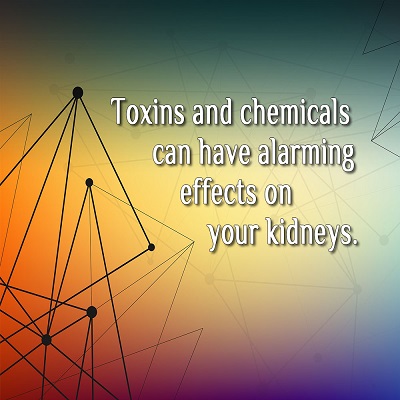 Kidney disease is increasing every year. One of the reasons is the various toxins and chemicals our kidneys are filtering out every day. To help you realize the importance of having healthy kidneys, it helps to know what they do.
Kidney disease is increasing every year. One of the reasons is the various toxins and chemicals our kidneys are filtering out every day. To help you realize the importance of having healthy kidneys, it helps to know what they do.
How Do Your Kidneys Function?
Your kidneys are highly important organs of the urinary system. This system is where the urine, your fluid body waste, is dispensed, deposited, and expelled by your kidneys through two thin channels, the ureters, and then fills your bladder. The urine then goes out of your body through the urethra.
Your kidneys filter the waste products from food, medications you take, toxins, and excess water from your blood, then send the blood back to your heart. Other critical functions include control and filtering of minerals in your blood and stimulating hormones that will produce stable levels of red blood cells.
Their functions contribute to bone health, maintenance of normal blood pressure, and provide a healthy balance of minerals and salt so that the tissues in your body can work normally. Chemicals and other toxins pass through your kidneys when they are filtering your blood every day and some are difficult to expel, so your kidney can be adversely affected by toxin overloads.
What are the Causes and Effects of Toxins and Chemicals on Your Kidneys?
Various chemicals and metals cause damage to the kidneys while others can create irregularities that may ultimately develop into cancer or kidney failure. Aside from some toxins being difficult to excrete, your kidneys will lose their ability to expel them as you age. This is not so much a factor of aging itself, but the aggregate effect of toxic overload over time.
This means the toxins can accumulate in your kidneys. Some causes and serious effects of toxins and chemicals are:
Long-Term Exposure to Chemicals and Heavy Metals
Exposure to chemicals and heavy metals such as cadmium, mercury, chromium, lead, platinum, or uranium, especially in your workplace, can cause nephrotoxicity or rapid deterioration of your kidneys. Toxins such as cadmium are difficult to excrete. This effect can cause or worsen osteoporosis because your kidneys cannot properly activate the vitamins needed by your bones. Other functions of your kidneys also weaken as your kidneys degenerate.
Use of Fertilizers, Pesticides, and Herbicides
Spraying the herbicide glyphosate around crops and your house emits toxic gases. Based on animal research, frequent spraying even of low doses of glyphosate can damage your kidneys. Drinking glyphosate contaminated water can also harm your kidneys.
Use of Fluorinated Hydrocarbons
These compounds are polymers such as Teflon, which are used as non-stick coatings on pans, pots, in the prevention of stain on carpets and cushions of furniture, in waterproof and breathable clothes, and many other uses. They emit toxic gases when heated at high temperatures because these polymers break down. They cause oxidative stress to your kidneys and can eventually result in loss of kidney function.
Chronic Use of NSAID
Nonsteroidal inflammatory drugs (NSAIDs) that were once available by prescription only can now be bought over-the-counter. Many people are unaware of their long-term serious side effects. Habitual or indiscriminate use of single or combined NSAIDs such as high-dose aspirin, acetaminophen, COX-2 inhibitors, ibuprofen, indomethacin, and naproxen can harm your kidneys.
Long-term use of these painkillers can lead to a chronic kidney problem called analgesic nephropathy. It damages the tiny blood vessels that filter wastes and it can lead to atherosclerosis, cancer, and severe kidney failure.
Smoking Tobacco
This will not only damage your lungs but damage your kidneys as well. Cigarettes contain a significant amount of cadmium and nicotine that will obstruct the blood vessels connected to your kidneys, decreasing their filtration ability.
Overconsumption of Foods Rich in Phosphorus
Your kidneys will have difficulty filtering high levels of phosphorus from your blood, so persistently high levels can cause a kidney disorder. Some of the high phosphorus foods to limit are beans, bran cereals, dairy foods, lentils, nuts, oatmeal, bottled iced tea, colas, and drinks with added phosphate.
Also, phosphates are produced when phosphorus is combined with other substances. It increases fibrosis which is caused by exposure to toxins that block your blood vessels. Increased levels of phosphates in your blood can be a sign of kidney failure. Phosphates are found in additives, bread leavening, anti-caking agents, and flavorings.
Excessive Salt Intake
This causes kidney degeneration or the progressive loss of your kidney’s ability to function over time. Exceeding even two to six milligrams of salt a day can make your kidneys overloaded and impair their ability to expel other toxins such as acidic metabolic toxic wastes.
Severe Dehydration
Dehydration can cause difficulty for your kidney in removing toxic wastes and for your blood to deliver nutrients to your body. Your kidney needs water to excrete wastes in urine filtered from your blood. Avoid coffee and sugared beverages during hot weather because they cannot remedy dehydration. Constant dehydration can cause permanent kidney degeneration.
Awareness of the hazards of toxins and chemicals in your home and workplace is your first step in preventing kidney disease.






